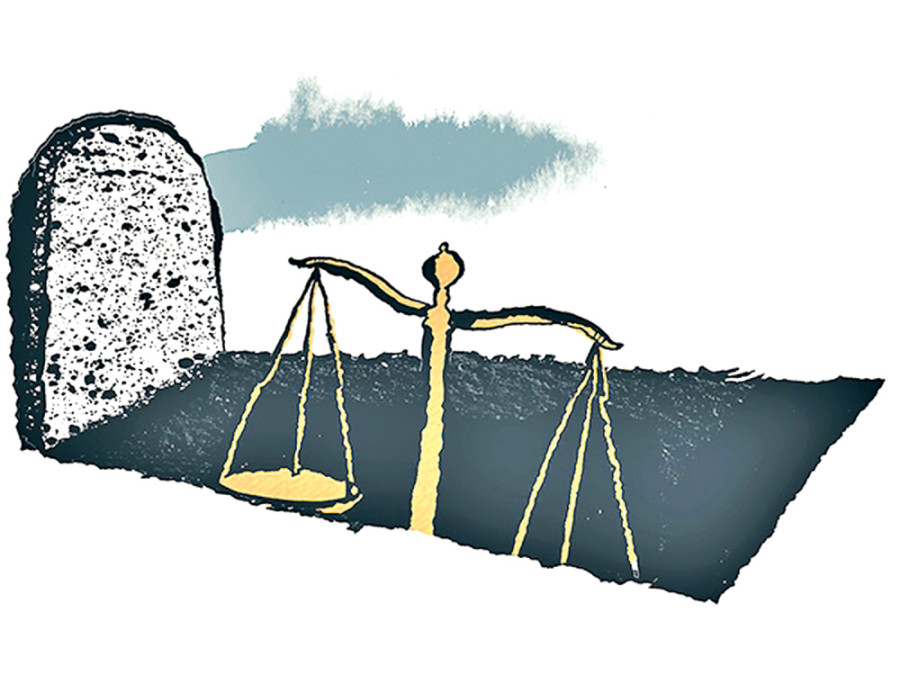Opinion
One year after
The TRC and the CIEDP have not laid the groundwork for ensuring truth and justice
Suman Adhikari
The Truth and Reconciliation Commission (TRC) and the Commission for the Investigation of the Enforced Disappeared Persons (CIEDP) have spent more than a year of their tenure without laying the groundwork for ensuring truth and justice to victims of gross human rights violations during the decade-long armed conflict. The two commissions have submitted their one-year interim report, but were both unable to develop a legal and structural framework to accomplish their mandate to reveal the truth and make recommendations on reparation, prosecution and non-recurrence. They also could not assure the public that their work would be victim-centric and gain the confidence and collaboration of the conflict victims and stakeholders.
The victims of gross human rights violations have realised that their traumas are similar regardless of which side was responsible, and have established a joint network called the Conflict Victims’ Common Platform (CVCP). It is obvious the conflict victims do not trust the TRC and the CIEDP and doubt their credibility as they were formed through political consensus and without their involvement. In April 2015, the CVCP conducted countrywide consultations with the conflict victims and civil society and enunciated the concept of Critical Engagement with the objective of utilising the TRC and the CIEDP to the maximum for the rights of victims.
Meaningful participation
Conflict victims, human rights communities and international communities including the Office of the High Commissioner for Human Rights (OHCHR) have been continuously raising concern over amending and formulating laws related to criminalisation of disappearance and torture in accordance with the Supreme Court verdict. The CVCP has consistently demanded a victim-centred approach with a clear roadmap on the basis of the principles of transitional justice established by the Supreme Court.
The TRC has formed expert committees and developed regulations and procedural guidelines on women, children and a disabled-centric approach, communication, dialogue and outreach. Conflict victims including the human rights community have campaigned for years and contributed to a victim-centric consultative transitional justice process. But the commissions did not realise the stake and contribution of the conflict victims and did not have meaningful consultations and ensure their ownership. The victims were seen as merely beneficiaries and objects of sympathy instead of being treated as participants and prime stakeholders.
It is important for the CIEDP and the TRC to hold consultations with conflict victims and stakeholders in the districts, and they have done so in dozens of districts. But the question is what level of preparations were made, feedback incorporated and victims’ trust, ownership and collaborations accomplished through the consultations. It has been observed that those consultations lacked proper preparations and in-depth consultations on essential legal provisions and procedures. There are a number of instances of the government not supporting the commissions such as not managing office space and staff on time and delaying the approval of regulations. The commissions have complained that they could not speed up their work due to delays by the government in approving the regulations. The TRC is still spending time in district consultations and collecting testimonies and studying them as its major mandate.
It is not possible for the commissions to develop their local structures right away and working through Local Peace Committees (LPCs) seems to be a good option. But the bitter fact is that the politically dominated LPCs are not credible and sensitive enough to address the trauma of conflict victims, and the TRC has also realised this. Reviewing the terms of reference and restructuring the LPCs is essential.
Fuzzy roadmap
The conflict victims community has been drawing the attention of the government for years to the discrimination among victims in relief distribution, inadequate provision of scholarships to the children and difficulties in their education, need for a simplified relief distribution process, arbitrary determination of the percentage of disabled people and the extent of the compensation to be provided, need for an effective training programme for long-term livelihood, psychosocial counselling, practical difficulties faced by the family members of the disappeared persons with regard to property rights and recognition of the victims of conflict related sexual violence and torture.
The commissions themselves are in a state of confusion and have not been able to deliver a clear roadmap on victim-centred transitional justice, essential laws and structure. The TRC has been arguing for internationalisation of conflict-era cases and intervention by the UN. The current working modality and dilemma of the commissions clearly show what will be achieved during the rest of their tenure. During the past year, the commissions missed the opportunities and disappointed the conflict victims, and further pushed away truth and justice.
Adhikari is the chairperson of the Conflict Victims’ Common Platform




 17.12°C Kathmandu
17.12°C Kathmandu










